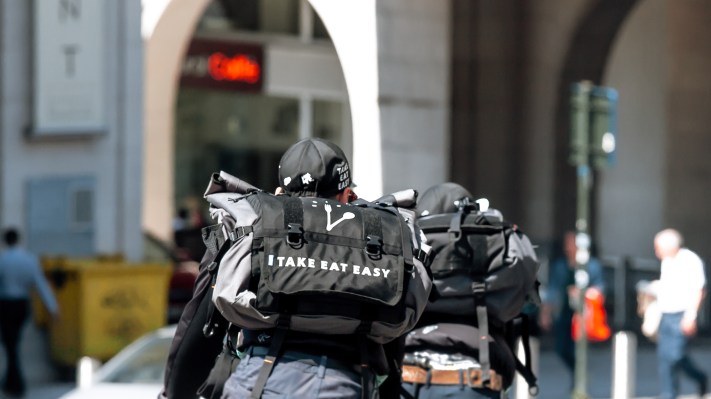The restaurant food delivery wars in Europe were always going to get messy and the latest casualty is Take Eat Easy. Despite celebrating its 1 millionth order last week, the Brussels-headquartered startup has ceased trading and will file for “juridical restructuring” after it failed to raise a much-needed Series C round and has run out of money.
And although there’s still hope that the company will find a buyer, it hasn’t come soon enough to continue operating in what has become an incredibly competitive — read: cash intensive — market, with heavily funded competitors that include London-based Deliveroo, Delivery Hero’s Foodora, Uber’s UberEATs, and potentially Amazon, to name but a few. Competition that had a deadly impact on Take Eat Easy’s ability to raise further funding.
Take Eat Easy co-founder and CEO Adrien Roose tells me that the company began raising its Series C round in October last year, and that by the following March the startup had been turned down by 114 VC funds (yes, you read that correctly!).
A term sheet was eventually put on the table by a “French, state-owned, logistics group” — thought to be GeoPost, the delivery subsidiary of Le Groupe La Poste, which is also an investor in on-demand delivery startup Stuart — for a €30 million investment. Three months later, after a slow due diligence process, the deal fell through, providing a final nail in the coffin for Take Eat Easy. In the words of Roose, “there was no plan B”.

“For the last 8 weeks, we’ve desperately tried to find solutions to keep the business alive. We’ve worked on both financing and acquisitions deals in parallel, unfortunately none of them materialised. We have now ran out of time to keep operating business as usual, and are filing for judicial restructuring,” he says in a blog post.
Roose also says that over the past year, Take Eat Easy reached 30 per cent monthly growth, and, along with hitting over a million deliveries, had scaled its restaurant partnerships from 450 to 3,200 and its customer base from 30,000 to 350,000.
He also tells me that London represented a “small market” for the startup — and, indeed, we heard the company’s U.K. staff were sent home last week, giving notice that something was up — but that Take Eat Easy was strongest in France, as well as its home country of Belgium.
And whilst it’s understandable that investors feared Deliveroo and Uber, and the potential market entry of Amazon (not for the first time), questions arise over Rocket Internet’s original backing of Take Eat Easy and how the German company builder supported the startup throughout its journey.
Originally an investor in Take Eat Easy via its venture arm GFC, Rocket Internet subsequently acquired a direct competitor in the form of Germany’s Volo. That company then became Foodora, which was in turn sold to takeout marketplace Delivery Hero, in which Rocket Internet owns a 40 per cent stake.
My understanding is that Rocket Internet then sold its shares in Take Eat Easy in September, again to Delivery Hero, meaning that, like Rocket Internet before, the company now owned two competing restaurant delivery startups. Puzzling to say the least.
The obvious solution would have been to merge Foodora and Take Eat Easy into a single company but that would have required Delivery Hero to purchase the remaining shares in Take Eat Easy at significant cost, an acquisition that it clearly didn’t have the stomach for.
